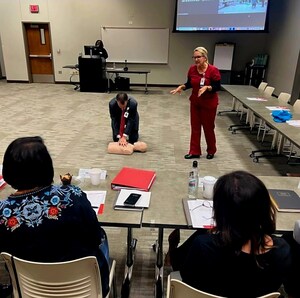Emergency Medical Services and Health Advocates Form Illinois EMS Alliance
New Organization to Advocate for "Essential Service" Designation and Greater Resources to Help Save Lives
SPRINGFIELD, Ill., Dec. 4, 2012 /PRNewswire-USNewswire/ -- Emergency Medical Services (EMS) workers, health officials, and patient advocates from around the state gathered at the Capitol Building today to announce the formation of the Illinois EMS Alliance and to send an important message – EMS IS ESSENTIAL IN ILLINOIS. Emergency medicine professionals, including EMTs, Fire Chiefs, physicians and statewide EMS representatives stood in solidarity with leading voices from the new coalition as they jointly expressed concern over the future of EMS. The Illinois EMS Alliance will work to support action on recommendations made in the newly released IL House Task EMS Force Report, and will help legislators chart a sustainable path forward for EMS in Illinois.
The bipartisan 24-member House EMS Task Force held hearings throughout Illinois in late 2011, and released its final report on November 20, 2012, urging the legislature to:
- Create a dedicated annual funding stream of $40 million from gambling expansion revenues or other sources to prevent EMS in Illinois from further atrophy
- Officially designate EMS as an "essential service" similar to existing designations for Police and Fire services
- Pursue regulatory reforms that would make it easier for EMS agencies to provide optimal care in the current resource-scarce environment
"The socio-economics of society in general have changed over the past decade causing Emergency Medical Services (EMS) in many areas of Illinois, especially rural areas, to be stretched to the breaking point," said Greg Scott, Director of McLean County Area EMS System. "Across the State, we are seeing instances of EMS providers closing their doors or not having enough resources to sustain their operation for much longer. This then has a catastrophic domino effect on neighboring EMS providers causing additional operational strains on the Emergency Healthcare System."
The reality of a shrinking number of EMS providers can have life or death consequences for Illinoisans. "As these providers close their doors, there are fewer ambulances covering larger areas and more people, which means longer 911 wait times and worse outcomes for Illinoisans in need of emergency medical care," said Alex Meixner, Government Relations Director for the American Heart Association.
In its 40 year history, and unlike the equally important Fire and Police services, EMS has never been legally designated an "essential service" in Illinois and has therefore seen its state funding repeatedly swept away each year.
"Legally designating EMS as an essential service in Illinois is one of the Alliance's top priorities," said Mike Hansen, Co-chair of the Illinois Fire Chiefs EMS Committee & Chairman of the State EMS Advisory Council. "What service can be more important to the citizens of Illinois than life-saving care? When a person calls 911, the expectation is that a trained professional will arrive immediately and will have the proper training and equipment to provide the best emergency care possible."
Currently, 69,216 men and women serve as EMTs and paramedics in Illinois, many as unpaid volunteers. That number appears to be falling, however, and recruitment and retention of volunteer EMTs in rural areas has become so problematic that the Illinois State Legislature passed a law this past spring allowing 16-year-olds to drive ambulances as "Provisional First Responders."
"Not enough money and too many 911 EMS calls have led to older ambulances being kept in service well past their planned replacement dates, and often with outdated equipment on board," said Dennis Presley, Coordinator of the Rural Medical Transportation Network at SIU Carbondale. "Creative solutions such as helping folks find and use public transit and other non-ambulance transport options for non-emergency medical care will be an important part of our efforts to reduce the burden on EMS agencies as well."
"The Taskforce report does a good job of looking at the totality of our EMS infrastructure, from large urban departments to rural volunteer agencies and our state's critical network of private ambulance providers as well," said Mary Ann Miller, VP of Air Medical Services & EMS System for Superior Ambulance Service and Vice-Chair of the Illinois EMS Advisory Council. "Frankly, it's no surprise that so many EMS providers are struggling in Illinois given that our state's Medicaid reimbursement rate for EMS transport hasn't gone up one thin dime in 12 years, while our costs on gas alone have more than doubled," added Miller.
"Illinois' hospitals large and small work closely with the amazing men and women of EMS to help save lives and improve patient outcomes every day," said Peggy Jones, a consultant with the Illinois Critical Access Hospital Network, "but doctors can't save a patient who doesn't make it through the door in time."
The Illinois House EMS Task Force visited communities throughout the state, collecting testimony from EMS providers on the challenges they are currently facing, and then provided recommendations based on those challenges.
"We thank Representatives Moffitt and Dugan, Lt. Gov. Sheila Simon and the rest of the members of the task force for the hard work they put into this report," said Hansen. "The tough truths they've helped bring to light need to be addressed, and the Illinois EMS Alliance is going to work hard to turn those recommendations into reality."
Illinois EMS Alliance
The Illinois EMS Alliance is a fast-growing coalition of EMS providers and stakeholders from across the state who support increased resources and smart reforms for EMS.
Leading members of the Alliance quoted above include:
- Mike Hansen, Co-chair of the Illinois Fire Chiefs EMS Committee & Chairman of the IL EMS Advisory Council
- Peggy Jones, Consultant, Illinois Critical Access Hospital Network
- Alex Meixner, Government Relations Director, American Heart Association
- Mary Ann Miller, VP of Air Medical Services & EMS System, Superior Ambulance Service & Vice Chair, IL EMS Advisory Council
- Dennis Presley, Coordinator, Rural Medical Transportation Network, SIU Carbondale
- Greg Scott, Director, McLean County Area EMS System
To learn how you can support the efforts of the Illinois EMS Alliance, and to ask your legislator to make EMS a priority in Illinois, go to www.yourethecure.org/illinois.
To view a copy of the Illinois House Task Force Report, go to http://www.sfm.illinois.gov/documents/EMS%20Funding%20Task%20Force%20Report-Moffitt%20FINAL.pdf
About the American Heart Association
The American Heart Association is devoted to saving people from heart disease and stroke – America's No. 1 and No. 3 killers. We team with millions of volunteers to fund innovative research, fight for stronger public health policies, and provide lifesaving tools and information to prevent and treat these diseases. The Dallas-based association is the nation's oldest and largest voluntary organization dedicated to fighting heart disease and stroke. To learn more or to get involved, call 1-800-AHA-USA1, visit heart.org or call any of our offices around the country.
SOURCE American Heart Association
WANT YOUR COMPANY'S NEWS FEATURED ON PRNEWSWIRE.COM?
Newsrooms &
Influencers
Digital Media
Outlets
Journalists
Opted In






Share this article